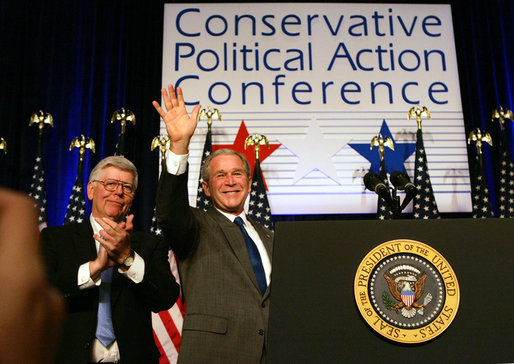Lessons From CPAC: The Rise of Populism in Conservatism
Populist movements mimic conservative ideology, but where’s the reasoning?
This past week, the Conservative Political Action Conference in National Harbor, Maryland emanated a sense of patriotism, freedom, and conservatism. Speakers from all walks of life participated in the largest gathering of conservatives in the world. But was CPAC 2019 the same as the CPAC from 1985 or even CPAC of 2008? Definitely no. The modern idea of a conservative movement has strayed away from discussions led by Barry Goldwater, William Buckley, and Ronald Reagan – it now instead focuses on the ideology of populist conservatism.
While the thoughts behind populist conservatism have their foundation in classical conservatism, they lack the logical reasoning that grounds conservative thought. At their core, populist policies appeal to ordinary people because of their utilitarianism. Populism often mimics tenets of classical conservatism, but — crucially — it passes over rational concepts from the era of Edmund Burke.
As the father of contemporary conservatism, Edmund Burke argued that policy should not be made to benefit an individual, but instead should benefit the longevity of the state. Populism has some similar viewpoints to traditional conservatism, but it can lead to a slippery slope where individuals are driven by what is best for themselves, rather than what is best for the nation. Conservatives ideologically believe that people are – by human nature – self-interested, acknowledge that in order to prevent atrocities and total anarchy there needs to be a certain level of morality to ensure legitimacy and prosperity.
How populism differs from conservative thought is exemplified by Ayn Rand. In Atlas Shrugged, she makes the case for objectivism: the idea that if individuals are focused on self-interested goals, it will inherently lead to the success of the society. This may be true to a certain degree, but if one believes in the conservative viewpoint of human nature, Rand’s argument will lead to chaos and selfishness. Rand and her ideas of objectivism continue to inspire the contemporary libertarian movement, a movement that has recently produced a stunning takeover of the conservative base in America.
That takeover has been particularly visible at CPAC, which has been a growing event in the last few years, and has now become the largest gathering of conservatives in the world. Each year, CPAC holds a straw poll where the participants of the conference vote on who is considered the leader of the conservatism movement at the time of the event. It’s unfortunate for intellectual conservatives when Rand Paul and Ron Paul, two individuals more associated with libertarianism, win five out of the last seven of these CPAC straw polls.
And unfortunately, CPAC was filled with populism disguised as traditional conservatism of the Ronald Reagan and William Buckley era. Although there were a substantial number of advertisements with notable conservative figures from the past, like Ronald Reagan, the speakers seemed to unknowingly lean towards populism. Many of the speakers seemed to focus on getting the crowd riled up as if it was a rally. The days of talking points and ideology-based discussions are regrettably nowhere to be found as chants of “USA” and “lock her up” would fill the room.
Conservatism depends on lessons like Edmund Burke’s belief that an individual should do what they think is best for one’s country. The thought of populism that has invaded the conservative movement has morally bankrupted different aspects of the conservative movement. Although it may seem best for America, the ethical ramifications of political choices must be brought back to true conservatism.
We should also remember that the point of this criticism is not to engage in a circular firing squad at a time when the radical left poses such an existential threat to the Republic. However, we also need to ensure that virtue and patriotism guide all our ideas and decisions.
The days of ideological reasoning and authentic conservatism need to return to CPAC. The future of the conservative movement relies on CPAC since the event defines what a conservative is. CPAC needs to create an environment where attendees can focus on the ideological standpoint of conservatism, rather than purely opinionated talks than do nothing to gain knowledge or further the conservative movement. Without authentic conservative leadership, the conservative movement for the 21st century will shrink during a time when socialism is becoming mainstream. This would be a vast step back in American history.




 PAI is a think tank devoted to research and analysis of political, philosophical, economic, social, and cultural issues from a uniquely Midwestern perspective. We are grounded in the principles of classical conservatism, which has roots in the very foundation of Western civilization and the classical period.
PAI is a think tank devoted to research and analysis of political, philosophical, economic, social, and cultural issues from a uniquely Midwestern perspective. We are grounded in the principles of classical conservatism, which has roots in the very foundation of Western civilization and the classical period.